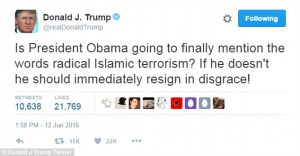President Obama made headlines last week by speaking at a CNN Presidential Town Hall. The President was confronted by Gold Star mother Tina Houchins, who asked him why he refused to use the term “radical Islamic terrorism” to describe terrorist attacks against the United States in recent months. President Obama again opted to defend his deliberate choice of words, drawing a contrast between himself and certain “people aspiring to become president.”

The President’s refusal to use the phrase “Islamic terrorism” has become a source of outrage for many republicans, who claim that a refusal to “name the enemy” betrays Obama’s lack of dedication to the fight against terrorism, and moreover displays his blindness to the relationship between terrorism and Islamic religion. Democrats counter by claiming that use of the phrase needlessly associates terrorism with all Muslims, an action which they say exacerbates Islamophobia and distrust in the United States.
Why do the Words Matter?
As David Zarefksy points out, the president is in a unique position to define one of the greatest threats facing America today. As Zarefsky puts it, “The president, by defining a situation, might be able to shape the context in which events…are viewed by the public.”
Indeed, the Obama argument against using the phrase is strong enough that it was the same strategy utilized by George W. Bush following the 9/11 terrorist attacks. Defining terrorism as a specifically “Islamic” problem would shatter any effort at peaceful coexistence between Muslims and the rest of the world- a practice that could encourage individual radicalization and discourage international cooperation.
Obama chooses to disassociate “Islam” from “terrorism” and to define our understanding of the problem: Islam is not to blame for terrorism.
The Election to Define Terror
Come January, a new president will have the power to determine the relationship between the United States and Islam. Donald Trump, for his part, has already vociferously criticized the Obama administration for its refusal to use the phrase, while Hillary Clinton has only partially fallen in line with the Obama tactic (albeit with reluctance).
The next president will need to weigh carefully the effects of his or her rhetoric on the rest of the world, and decide whether or not irrevocably associating “Islam” with “terrorism” is a wise move. As the threat of terrorism increases, so too will the importance of its definition.

It is interesting how well this great debate on the “correct” phrasing of terrorism illustrates the importance of labeling. There are essentially three groups of people trying to attach a label to the recent terrorist acts. The first is Obama and his administration. As you have mentioned, he refuses to refer to the terrorist acts as “radical islamic terrorism.” And therefore assumes the much more vague term of “Terrorism” in general. The second group is the Republicans and those on the right side that want to label it for what it is: “Radical Islamic Terrorism”. They do not want to leave anything up for interpretation, they want the enemy clearly defined. The final group that has attempted to attach a label to these recent attacks are the terrorists themselves. ISIS for example, has officially given themselves the label “Islamic State in Iraq and the Levant” (sometimes abbreviated to ISIL). While there are many Islamic people groups who do not agree with the opinions and beliefs of the radicalized muslims, it cannot be denied that many of the acts of terror do in fact stem from an Islamic root. I do not believe that there is any benefit in denying what the terrorists themselves claim – Radicalized Islamic Terrorism is in fact what is taking place.
Source: http://www.cnn.com/2014/09/09/world/meast/isis-isil-islamic-state/